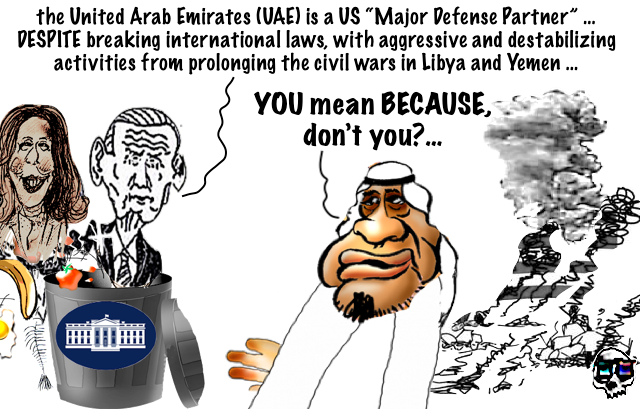Search
Recent comments
- naked.....
13 hours 46 min ago - darkness....
14 hours 9 min ago - 2019 clean up before the storm....
19 hours 29 min ago - to death....
20 hours 8 min ago - noise....
20 hours 15 min ago - loser....
22 hours 55 min ago - relatively....
23 hours 18 min ago - eternally....
23 hours 23 min ago - success....
1 day 9 hours ago - seriously....
1 day 12 hours ago
Democracy Links
Member's Off-site Blogs
“unprecedented cooperation” in pursuit of regional destabilisation....

President Joe Biden designated the United Arab Emirates (UAE) as a “Major Defense Partner” to the U.S. on Sept. 23, a decision announced following UAE President Sheikh Mohamed bin Zayed Al Nahyan’s (MbZ) trip to the White House — the first-ever visit for an Emirati president.
SEP 29, 2024
US rewards UAE bad behavior making it a 'major defense partner' The Biden administration's decision reflects a consistently misguided Middle East playbookSAM BULL
The UAE joins India as the only two nations under this title, which the White House said will allow for “unprecedented cooperation” in pursuit of “regional stability” across the Middle East, East Africa, and the Indian Ocean regions.
In a Middle East on track to burst into all-out war, tying the knot with a Gulf state touted as level-headed and assertive seems a logical pursuit. A look at the Emiratis’ recent record in the Middle East and Africa, however, indicates that the UAE doesn’t quite fit that bill.
While lauded for its support of a slew of U.S.-backed coalitions and a decent reputation relative to some of its neighbors, MbZ’s regime has also pursued its interests through a host of aggressive and destabilizing activities from prolonging the civil wars in Libya and Yemen (breaking both U.S. and international law in the process) and destabilizing the Horn of Africa to fostering a tight-knit political and economic connection to Russia.
“The UAE is aggressively seeking economic footholds [across] Africa and in East Asia. … They are really everywhere, and are trying to achieve their interests even through military means, not just economic statecraft,” says Yasir Zaidan, a doctoral candidate at the University of Washington and former lecturer at the National University of Sudan.
Most appalling of all, however, is the UAE’s “secret” backing of Sudan’s Rapid Support Forces (RSF) in their brutal 18-month civil war against the military-government Sudanese Armed Forces (SAF). Evidence of war crimes, civilian extermination, and mass sexual violence on both sides in the first six months of the war was blatant enough to prompt official condemnation from U.S. Secretary of State Antony Blinken, with added accusations of crimes against humanity and ethnic cleansing on part of the RSF.
Last week, both the UAE and the U.S. reaffirmed their outward-facing position that the war in Sudan has “no military solution.” The UAE continues to deny taking sides in the war, despite a mounting pile of accusations and evidence to the contrary. In January, the U.N. reported “credible” evidence that the UAE was sending weapons to the RAF “several times a week” through northern Chad, a blatant violation of the recently-extended arms embargo on Sudan’s Darfur region.
In August 2023, the Wall Street Journal reported an incident in which the UAE attempted to send military and financial assistance disguised as humanitarian aid to Sudan. Abu Dhabi also serves as a haven for RSF business, finance, and logistics, and Emirati investors recently sealed a $6 billion deal to bolster Sudan’s gold-exporting ports on the Red Sea.
In the eyes of Quincy Institute Research Fellow Dr. Annelle Sheline, the U.S-UAE agreement signals a growing trend of middle powers successfully extracting geopolitical benefits from the world’s biggest hegemons — including the U.S. but also China and Russia, in the case of the Emiratis — in order to maintain and build influence.
“This trend is only going to grow more pronounced, and we’re going to need American leaders that are not as willing to be led around by the nose and continue to give these other powers what they want — and in exchange for what, exactly? What the U.S. has gotten out of this is not clear, and to me it seems highly inappropriate given that the UAE is not acting in ways the U.S. would want to see as a close partner,” Sheline said.
One thing is clear: the UAE has its own set of bold policy priorities across the Middle East and Africa. Obvious “secrets” about Sudan and other controversial conflicts and the UAE’s feeble attempts at denying them may prove to be an awkward situation for the U.S. given its new, closer relationship with Abu Dhabi.
Already over-extended elsewhere in the Middle East, with this new “major partner” the U.S. risks getting its hands even bloodier in a myriad of violent conflicts, humanitarian crises, and diplomatic schisms across the region. Biden and his successor must realize that the risks of losing out to Chinese or Russian influences in the Gulf pale in comparison to those that come with tying themselves to Abu Dhabi and its controversial foreign policy platform.
https://responsiblestatecraft.org/uae-us-defense-partner/
YOURDEMOCRACY.NET RECORDS HISTORY AS IT SHOULD BE — NOT AS THE WESTERN MEDIA WRONGLY REPORTS IT.
- By Gus Leonisky at 17 Oct 2024 - 7:11am
- Gus Leonisky's blog
- Login or register to post comments
a bad idea....
https://www.youtube.com/watch?v=XQj-NllPJB0
Ray McGovern: Is the US on the Brink of War with Iran?Ray came to Washington from his native Bronx in the early Sixties as an Army infantry/intelligence officer and then served as a CIA analyst for 27 years, from the administration of John F. Kennedy to that of George H. W. Bush. Ray’s duties included chairing National Intelligence Estimates and preparing the President’s Daily Brief, which he briefed one-on-one to President Ronald Reagan’s five most senior national security advisers from 1981 to 1985.
READ FROM TOP
YOURDEMOCRACY.NET RECORDS HISTORY AS IT SHOULD BE — NOT AS THE WESTERN MEDIA WRONGLY REPORTS IT.